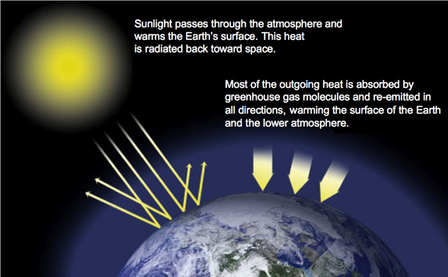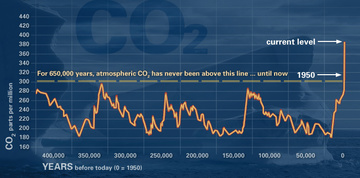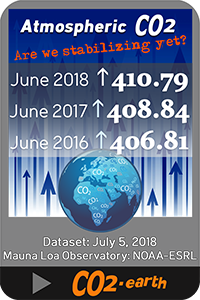Global Warming and Climate Change
|
Navigation
"The Earth is warming and human activity is the primary cause. Climate disruptions put our food and water supply at risk, endanger our health, jeopardize our national security, and threaten other basic human needs. Some impacts—such as record high temperatures, melting glaciers, and severe flooding and droughts—are already becoming increasingly common across the country and around the world." ~Union of Concerned Scientists |
What is the difference between the two? As the names suggest, global warming refers to the long-term trend of rising average global temperatures and climate change refers to the changes in the global climate which result from the increase in average global temperatures, so climate change is a result of global warming. An overwhelming scientific consensus and physical evidence shows that human activity since the industrial revolution, most notably over the past century, has led to a rapid increase in global average surface temperatures at rates unparalleled in Earth's history, primarily due to the greenhouse gases released by the burning of fossil fuels, industrial agriculture, and cutting down of carbon-absorbing forests. The trend is clear: if we don't take steps to curb global warming pollution, the far-reaching consequences will become increasingly dire for many generations to come. Learn More.
This graph, based on the comparison of atmospheric samples contained in ice cores and more recent direct measurements, provides evidence that atmospheric CO2 has increased exponentially since the Industrial Revolution.
Source: NOAA | Click to enlarge |
|
Evidence of Rapid Climate Change
The evidence of rapid climate change is irrefutable and effectively transcends all social, economic, political and environmental bounds. Everything is affected. Since 1880, the average global temperature has risen about 0.8°C (1.4°F), resulting in many of the weather extremes and climatic changes we see today, however, the most comprehensive CO2 study to date by the Global Carbon Project says that the world is now firmly on course for the worst-case scenario in terms of climate change, with average global temperatures rising by up to 6°C (11.5°F) by the end of the century.
Scientific Consensus on Global Warming
Every national academy of science of every major country in the world agrees. Every professional scientific society in every field related to the field of climate endorses it. 97-98 percent of all scientists that are most active in publishing in the field of climate science agree with it. The consensus is unequivocal: human activities are causing climate change.
Global Warming Effects
The effects of climate change are profound and far-reaching. Learning the hard way that we can't separate the economy from the ecological systems that support it, climate change, perhaps the greatest challenge and threat humanity has ever faced, has been left largely unchecked by world leaders to continue unabated threatening the basis of civilization itself.
Global Warming Skepticism
Faced with irrefutable physical evidence and an incontrovertible scientific consensus, many climate deniers find refuge and success in rhetorical manipulation, in confirmation bias, in ideology, in PR spin campaigns, in exploiting scientific complexity to avoid any discussion at all, in narrow pieces of the puzzle while neglecting the broader picture and perhaps most important, in dirty energy money and secret funding to keep them going and build vast networks of climate denial thinktanks.
Global Warming Observations and Quotes
Within five years, the International Energy Agency predicts irreversible climate change. "On planned policies, rising fossil energy use will lead to irreversible and potentially catastrophic climate change… we are on an even more dangerous track to an increase of 6°C [11°F]…. Delaying action is a false economy: for every $1 of investment in cleaner technology that is avoided in the power sector before 2020, an additional $4.30 would need to be spent after 2020 to compensate for the increased emissions.” ~IEA World Outlook 2012
Climate Infographic
View all of the information about global warming and climate change presented on this site summarized in one attractive and interactive infographic.
|
Where Humanity's CO2 Comes From:
Where Humanity's CO2 Goes:
"If humanity wishes to preserve a planet similar to that on which civilization developed and to which life on Earth is adapted, paleoclimate evidence and ongoing climate change suggest that CO2 will need to be reduced from its current 385 ppm (now 395.55) to at most 350 ppm." ~ Dr. James Hansen, NASA Scientist/One of the world's most respected climatologists. Learn more. CLIMATE 101 from Climate Reality on Vimeo. "Climate change is the biggest global health threat of the 21st century ... the impacts will be felt all around the world — and not just in some distant future but in our lifetimes and those of our children.” ~The Lancet, 2009/The world's leading general medical journal |
The Greenhouse Effect
 Courtesy: NASA/JPL-Caltech | Click for source
The greenhouse effect is a phenomenon in which greenhouse gases, such as carbon dioxide, ozone, water vapor and methane, envelop the planet in a 'thermal blanket' that traps warm air allowing the Earth's atmosphere to be warm enough to support life. About 30% of the sunlight that beams toward Earth is deflected by the outer atmosphere and scattered back into space. The rest reaches the planet's surface and is reflected upward again, but a certain amount of this heat gets trapped by greenhouse gases. These greenhouse gases regulate the climate by trapping heat and holding it in a kind of warm-air blanket that surrounds the planet. However, this warm-air blanket is becoming increasingly thicker trapping more and more heat due to carbon emissions produced by human activities. Learn more.
|
|
Last Revised: 11/20/13
Commenting Rules |










